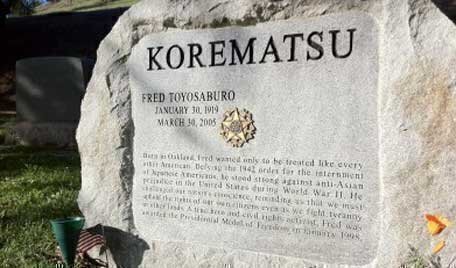[ad_1]
In December 1944, the Supreme Courtroom handed down one among its most controversial selections, which upheld the constitutionality of internment camps throughout World Battle II. Immediately, the Korematsu v. United States resolution has been rebuked however was solely lastly overturned in 2018.
 The Courtroom dominated in a 6 to three resolution that the federal authorities had the facility to arrest and intern Fred Toyosaburo Korematsu underneath Presidential Government Order 9066 on February 19, 1942, issued by President Franklin D. Roosevelt. He issued the order after fears generated by the Japanese Pearl Harbor assault made the security of America’s West Coast a precedence. Roosevelt directed the navy to isolate any citizen, if wanted, from a 60-mile-wide coastal space from Washington state to California and increasing inland into southern Arizona.
The Courtroom dominated in a 6 to three resolution that the federal authorities had the facility to arrest and intern Fred Toyosaburo Korematsu underneath Presidential Government Order 9066 on February 19, 1942, issued by President Franklin D. Roosevelt. He issued the order after fears generated by the Japanese Pearl Harbor assault made the security of America’s West Coast a precedence. Roosevelt directed the navy to isolate any citizen, if wanted, from a 60-mile-wide coastal space from Washington state to California and increasing inland into southern Arizona.
Korematsu was arrested for going into hiding in Northern California after refusing to go to an internment camp. Korematsu appealed his conviction by way of the authorized system, and the Supreme Courtroom agreed to listen to the case in October 1944. The court docket had heard the same case in 1943, Hirabayashi v. United States, and determined that Gordon Hirabayashi, a school pupil, was responsible of violating a curfew order.
The Korematsu v. United States resolution on December 18, 1944, referenced the Hirabayashi case, however it additionally dominated on the flexibility of the navy, in occasions of warfare, to exclude and intern minority teams. Justice Hugo Black, writing for almost all, included a paragraph that’s nonetheless debated in the present day and that established the judicial evaluation doctrine of “strict scrutiny” utilized to legal guidelines which goal sure suspect teams: “It must be famous, to start with, that each one authorized restrictions which curtail the civil rights of a single racial group are instantly suspect. That isn’t to say that each one such restrictions are unconstitutional. It’s to say that courts should topic them to probably the most inflexible scrutiny. Urgent public necessity might generally justify the existence of such restrictions; racial antagonism by no means can,” Black stated.
Later within the resolution, Black argued the need of the navy’s resolution.
“Korematsu was not excluded from the Navy Space due to hostility to him or his race. He was excluded as a result of we’re at warfare with the Japanese Empire, as a result of the correctly constituted navy authorities feared an invasion of our West Coast and felt constrained to take correct safety measures, as a result of they determined that the navy urgency of the scenario demanded that each one residents of Japanese ancestry be segregated from the West Coast briefly,” he stated.
In subsequent years, the American internment coverage has been met with harsh criticism.
One 1948 regulation supplied reimbursement for property losses incurred by interned Japanese-People. In 1988, Congress awarded restitution funds of $20,000 to every survivor of the ten camps. As a part of the Civil Liberties Act of 1988, Congress apologized “on behalf of the folks of the USA for the evacuation, relocation, and internment of such residents and everlasting resident aliens.” President Invoice Clinton awarded the Presidential Medal of Freedom to Korematsu in 1998, and President Barack Obama bestowed the identical honor on Hirabayashi in 2012.
Federal courts additionally overturned the unique convictions of Hirabayashi and Korematsu. And in June 2018, two Supreme Courtroom justices criticized the choice and agreed that it not has the drive of precedent as a part of a ruling on the Trump administration’s “journey ban” proclamation in Trump v. Hawaii. In Trump v. Hawaii, the Courtroom dominated 5-4 to uphold the president’s proclamation, with Chief Justice Roberts writing the bulk opinion and Justice Sotomayor writing a dissent.
In his opinion, Chief Justice Roberts strongly objected to analogies of the Trump v. Hawaii case to Black’s majority 6-3 resolution in Korematsu. “No matter rhetorical benefit the dissent might even see in doing so, Korematsu has nothing to do with this case,” Roberts stated.
However he then supplied probably the most highly effective rebuke of Korematsu on the Supreme Courtroom since Robert Jackson, Owen Roberts, and Frank Murphy dissented within the authentic case:
“The forcible relocation of U. S. residents to focus camps, solely and explicitly on the premise of race, is objectively illegal and outdoors the scope of Presidential authority. However it’s wholly inapt to liken that morally repugnant order to a facially impartial coverage denying sure international nationals the privilege of admission,” Roberts stated.
“The dissent’s reference to Korematsu, nonetheless, affords this Courtroom the chance to make categorical what’s already apparent: Korematsu was gravely improper the day it was determined, has been overruled within the court docket of historical past, and to be clear ‘has no place in regulation underneath the Structure,’” Roberts stated, quoting Justice Jackson’s 1944 dissent.
In her dissent, Justice Sonia Sotomayor (joined by Justice Ruth Bader Ginsburg), regardless of disagreeing with the bulk on the deserves, thought-about Roberts’ feedback within the majority resolution as proof the Courtroom had lastly overturned Korematsu. “Immediately, the Courtroom takes the essential step of lastly overruling Korematsu, denouncing it as ‘gravely improper the day it was determined.’ This formal repudiation of a shameful precedent is laudable and lengthy overdue,” Sotomayor stated.
[ad_2]
Source link




